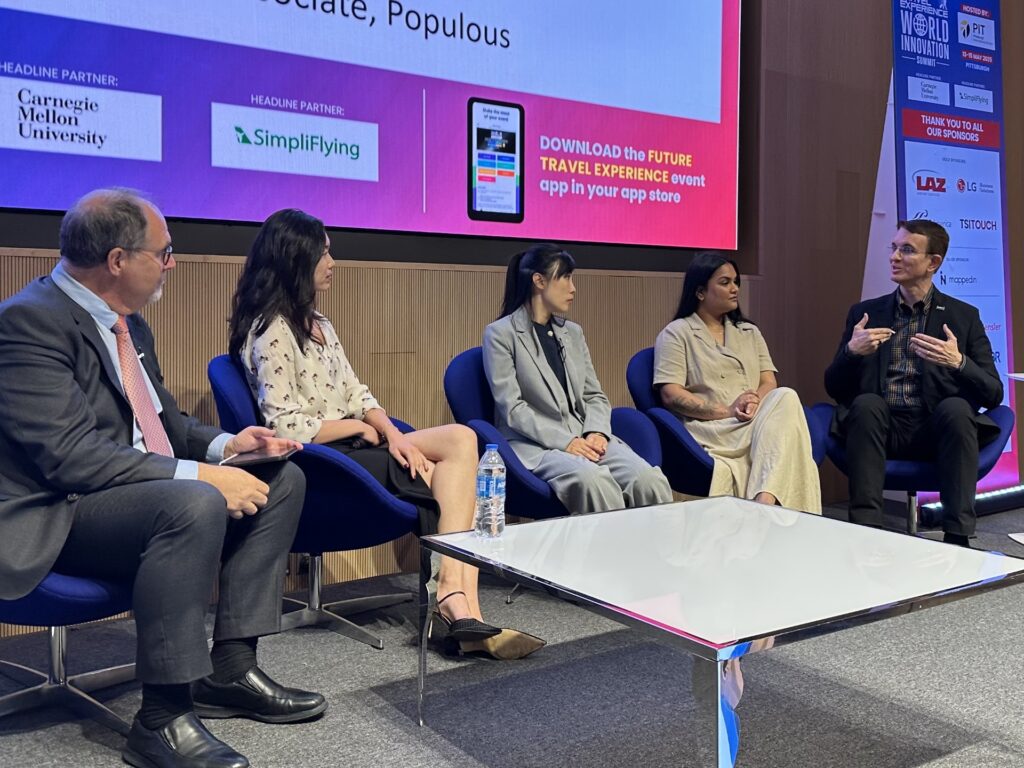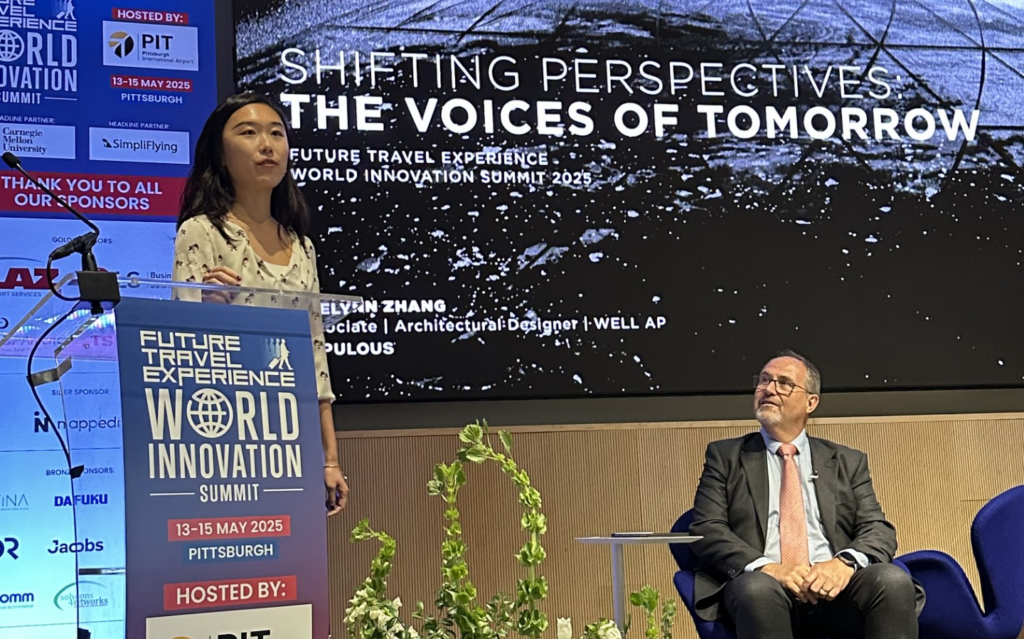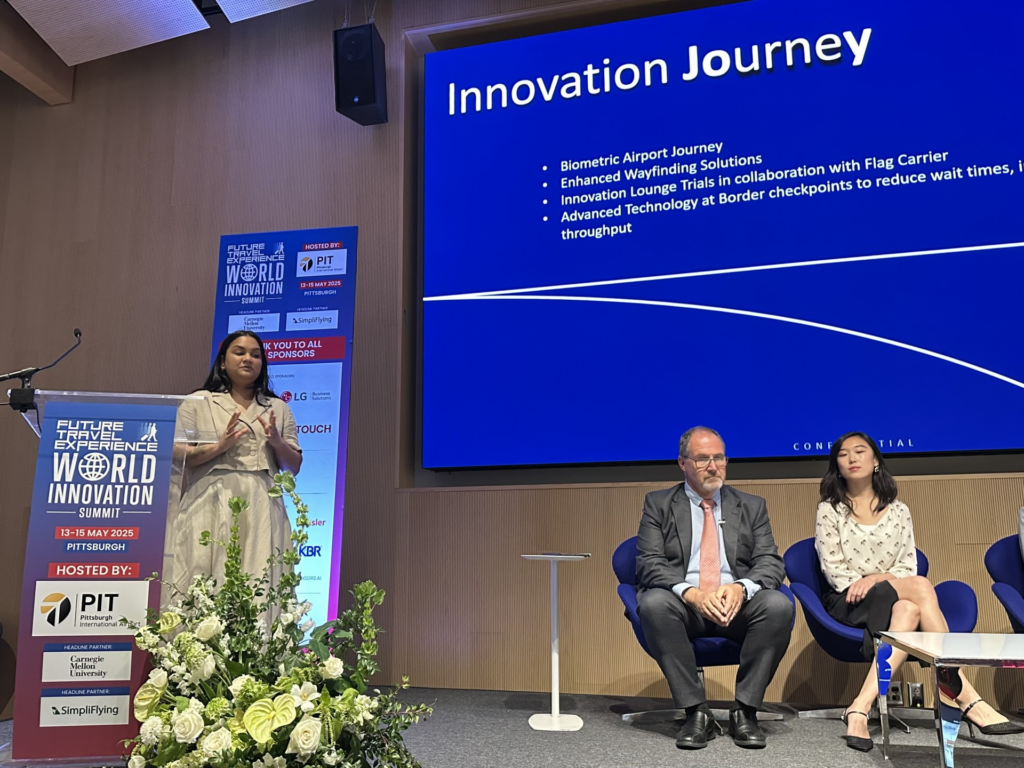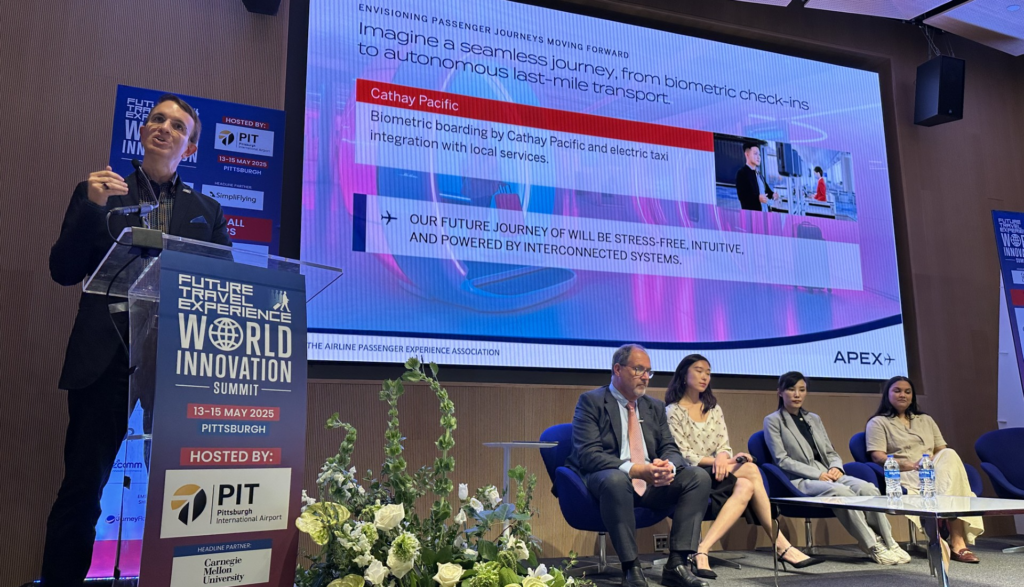Bold New Frontiers: Experts Reimagine the Passenger Journey at FTE’s World Innovation Summit
Share

The closing session of the first day at the Future Travel Experience (FTE) World Innovation Summit in Pittsburgh brought together leading minds from aviation, design, and passenger experience to address one of the industry’s most urgent imperatives: rethinking the end-to-end passenger journey.
Moderated by Aviation Consultant Andrew Price of Opermium.com, the panel featured SkyTeam Portfolio Manager Christie Liu; Greater Toronto Airports Authority’s Manager of Future Travel Experience Xerez Bridglall; Populous Associate Evelynn Zhang; and APEX Group CEO Dr. Joe Leader. Together, they delivered insights into what it will take to create a seamless, responsive, and human-centric travel experience.
Architecting Emotion into Airports

Populous Associate Evelynn Zhang opened the discussion with a vision grounded in design and empathy. She described how airports must respond not just to movement but to emotion. Using case studies from Austin-Bergstrom International Airport and Kansai International Airport in Japan, Zhang demonstrated how understanding local culture, passenger needs, and behavioral data can shape terminals that reflect a city’s identity while supporting every kind of traveler.
“We are designers of emotions,” Zhang said. “Our job begins with listening: to stories, to needs, to frustrations; and turning those into physical spaces that heal, excite, and support.”
In Austin, her team interviewed more than 2,000 passengers, mapped diverse journey profiles, and used interactive workshops to develop a strategic experience plan that now guides future expansions. In Osaka, they applied illustrated scenarios and flexible six-year phasing to minimize disruption during upgrades ahead of the 2025 World Expo.
“The future is not a single destination […] It’s a mosaic of different experiences shaped by who we are and where we come from.”
– Evelynn Zhang, Populous
Toronto Pearson’s Push for Joy and Inclusion

Greater Toronto Airports Authority’s Manager of Future Travel Experience Xerez Bridglall outlined how Pearson International Airport is working to put joy back into the travel experience.
“Our passengers aren’t transactions,” Bridglall said. “They’re individuals with expectations, families, and timelines. We’re evolving from a transportation hub into an experiential space.”
Bridglall detailed initiatives including biometric personalization, multilingual wayfinding enhancements, and innovation lounges co-developed with airline partners. The airport is also leveraging AI to streamline border processing while trialing relaxation and recovery spaces that cater to families, business travelers, and those with accessibility needs.
Toronto Pearson has emphasized measuring results through passenger behavior. “We prioritize demographics that engage with more parts of the airport,” Bridglall explained. “That’s where we can create the most value and improve satisfaction.”
“We’re redefining every checkpoint, from parking to gate through the lens of empathy and individuality.”
– Xerez Bridglall, Greater Toronto Airports Authority
SkyTeam’s Seamless Journey Through Shared Infrastructure

SkyTeam Portfolio Manager Christie Liu presented the alliance’s behind-the-scenes role in ensuring consistent and integrated passenger experiences across member airlines. With 18 carriers, SkyTeam focuses on enabling seamless interline journeys, especially during disruptions.
“The first level of great travel experience is the absence of discomfort,” Liu said. “And interline journeys often magnify that discomfort without shared infrastructure.”
She explained how SkyTeam’s centralized technology platform connects member airline systems, enabling features like shared baggage tracking, check-in, real-time flight information, and loyalty recognition. Liu also highlighted the alliance’s SkyTeam Rebooking solution, launched in 2018, which allows frontline staff to rebook disrupted SkyTeam passengers to final destinations regardless of fare type or ticket origin.
“Passengers compare us to Amazon and Netflix now,” she said. “They don’t see industries. They see experiences.”
“Passengers compare us to Amazon and Netflix […] Their expectations are not defined by the travel industry anymore. We need to catch up.”
– Christie Liu, SkyTeam
Reimagining Every Touchpoint: APEX Group CEO Dr. Joe Leader

In a keynote that set the tone for the broader conversation, APEX Group CEO Dr. Joe Leader called for a complete rethinking of the travel journey. He urged stakeholders to replace incremental improvements with bold reimagination supported by integration, wellness, and real-time responsiveness.
“Redesigning the airline passenger journey demands more than incremental change,” Dr. Leader stated. “It calls for a bold reimagination of every touchpoint, one that transforms transactions into human connections.”
Dr. Leader described how airports such as Munich, Incheon, and Doha are already leveraging biometric systems, predictive AI, and recovery zones to improve both efficiency and well-being. He praised airline leaders who have demanded transparency and personalized service for all passengers through enhanced digital platforms.
He pointed to examples such as United Airlines, which shares real-time operational data through its mobile app, and Delta, where flight attendants receive live updates to tailor engagement for each passenger.
“Personalization is not luxury, it’s loyalty engineering at its finest.”
– Dr. Joe Leader, APEX
Tackling the Realities of Disruption

Moderator Andrew Price brought the challenge of disruption to the forefront by sharing a personal travel experience. After a canceled flight, he encountered confusion, delays, and a lack of clarity across multiple communication channels. Although ultimately rerouted through Delta and American Airlines, the ordeal underscored how fragmented systems still affect passengers.
“I was given a refund option, nothing else,” Price explained. “No alternatives, no rebooking, just a dead end until I started calling.”
Liu responded by emphasizing that SkyTeam’s systems aim to remove exactly those pain points by enabling cross-airline collaboration. “Disruption is the moment when technology must prove its worth,” she said. “Passengers shouldn’t feel abandoned.”
Dr. Leader added that airlines should proactively preserve loyalty. “If you put someone on a different carrier, make sure they still get their miles,” he said. “Don’t make them ask. Protect the relationship.”
Rethinking Touchpoints: From Boarding to Better Use of Space
The audience raised concerns about inefficient boarding procedures. Dr. Leader suggested that the simplicity and effectiveness of Southwest Airlines’ numbered, self-sorting boarding groups could be applied elsewhere. “Crowding at the gate doesn’t help anyone,” he said. “Self-sorting works better and respects the passenger.”
Another attendee asked how airports decide where to invest between families and business travelers. Bridglall explained that travelers with dependents engage with more areas of the terminal and often experience higher stress levels. Enhancing their journey leads to more overall satisfaction and repeat usage.
Zhang supported this with a perspective on emotional engagement and spending. “If people feel calm, supported, and excited, they’ll explore more of the airport,” she said. “That drives both satisfaction and commercial activity.”
“If people feel calm, supported, and excited, they’ll explore more of the airport.”
– Evelynn Zhang, Populous
The Role of Data in Collaborative Experience Building
The discussion concluded with a focus on data sharing. A longtime airport executive in the audience noted that airports still lack access to basic passenger insights, even though airlines have rich data on traveler profiles.
Dr. Leader encouraged airports to take initiative using anonymized boarding pass scans and sensor data to study dwell times and movement patterns. “You don’t need names to build insights,” he said. “If airports lead, airlines will follow.”
Bridglall agreed that mutual accountability is essential. “The passenger journey is shared,” she said. “Airports and airlines can’t optimize it in isolation.”
Liu added that privacy-compliant operational data sharing among carriers within SkyTeam has led to improved experiences, and the same collaboration is possible across the broader ecosystem.
As the panel concluded the closing session of the day, Zhang returned to the human side of the travel experience. “If you make people happy, they tend to want to spend more money,” she said. “So again, questioning the users, the profiles, the passengers moving through the airport, but back to the fundamental question of how can we make people happy?”


